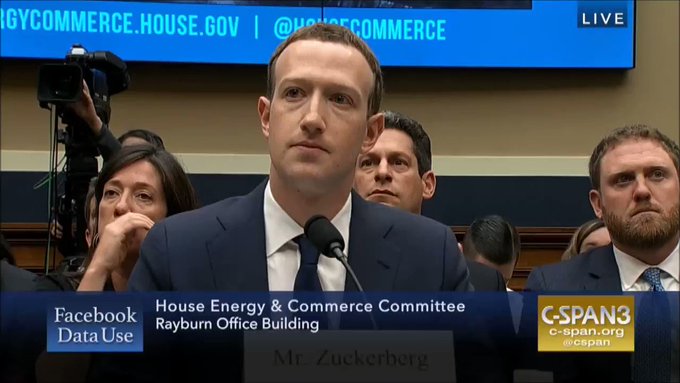In the News
By Luis Gomez
For a second day in a row on Wednesday, Facebook CEO Mark Zuckerberg sat for long hours answering questions from skeptical lawmakers weighing on whether to regulate the social media giant or allow it to do better in safeguarding the privacy of its billions of users.
At the center of Congressional hearings in Washington have been questions on whether Facebook did enough to protect the privacy of some 87 million users whose personal data was improperly harvested by the political firm Cambridge Analytica, and whether it can do enough in the future.
The hearings have been broadcast live and a great amount of attention has focused on Zuckerberg’s exchanges with lawmakers. Zuckerberg met with senators in a joint committee hearing on Tuesday, then on Wednesday he went to a House committee.
One of those pressing Zuckerberg for answers in the House Committee on Energy and Commerce on Wednesday was Rep. Scott Peters, D-San Diego, who asked whether profits may have interfered with Facebook’s promises to safeguard users’ privacy on the platform.
Here’s how that exchange went:
Peters: “Would it not be appropriate for us, once we define this duty, to assess financial penalties in a way that would sufficiently send a signal to the shareholders and to your employees … that the privacy you’re so concerned about is a bottom line issue at Facebook?”
Zuckerberg: “Congressman, it certainly is something we can consider. Although one thing that I would push back on is, I think, it is often characterized as maybe these mistakes happened because there’s some conflict between what people want and business interest. I don’t think that’s the case.“
“I think a lot of these hard decisions come down to different interests between different people. So, for example, on the one hand, people want their ability to sign into apps and bring some of their information and bring some of their friends’ information to have a social experience. On the other hand, everyone wants their information locked down and private. The question is not a business question as much as which of these equities you weigh more.”
Peters: “I think part is that, but part is also what happened with Cambridge Analytica. Some of the data got away from us. And I suggest to you if there were financial consequences to that, that made a difference to the business, not people dropping their Facebook accounts. It would get more attention.”
“It’s not so much a business model choice — I congratulate you on your business model — but it’s that these issues aren’t getting the bottom line attention that I think would have given or made them a priority with respect to Facebook. Let me follow up … on an exchange you had with Sen. [Lindsay] Graham about regulation.
“I think the [Sen. Graham] said, do you as a company welcome regulation? You said if it’s the right regulation, then, yes. Question: Do you think the Europeans have it right? You said, ‘I think they get some things right.’ I want you to elaborate on what the Europeans got right and what you think they got wrong.”
Zuckerberg: “Congressman, well, there are a lot of things that the Europeans do and I think that [General Data Protection Regulation] is going to be a very positive step for the internet. And it codifies a lot of things in there are things that we have done for a long time. Some are things that I think would be good steps for us to take. For example, the controls that this requires are generally privacy controls we have offered around the world for years.
Putting the tools in front of people repeatedly, not just having them in settings, but putting them in front of people and making sure that people understand what the controls are and that they get affirmative consent. I think that’s a good thing to do that we’ve done periodically in the past. I think it makes sense to do more. And I think it’s something GDPR will require us to do and it will be positive.”
Peters: “Anything they get wrong?”
Zuckerberg: “Um… I need to think about that more.”
You can watch the entire exchange in this clip.
The scandal has shaken confidence in Facebook in recent weeks, causing its stock prices to tumble and leading some people to go as far as abandoning the social media site altogether — a revolt pronounced under the hashtag #DeleteFacebook.
On March 21, Zuckerberg apologized for missteps that led to the scandal. And later on April 6, Zuckerberg publicly expressed support for the Honest Ads Act, the first and most significant set of regulation for political ads on the internet that has been proposed in Congress. Twitter offered its support for the legislation as well on Monday.
